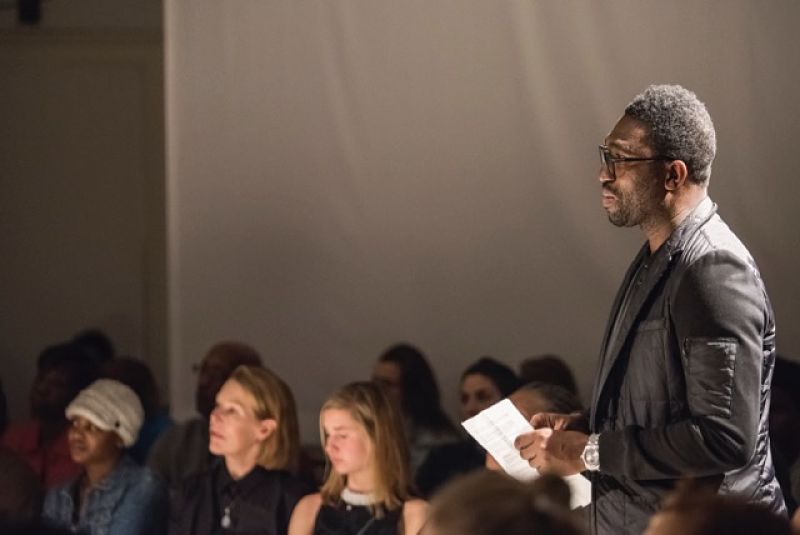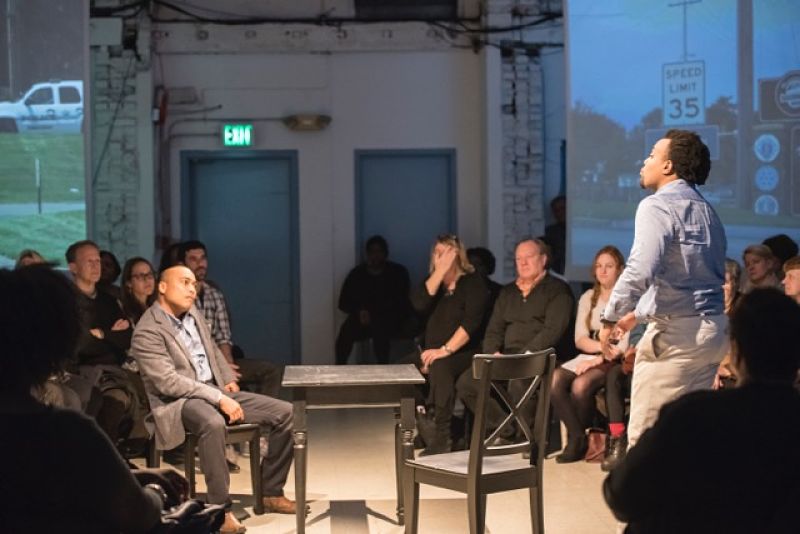It is the rare theatre budget that includes a line for “bail money.” But that potential expense was built into Center Stage’s financial planning for “My America Too”—a series of six short video plays inspired by what the theatre is calling “the new civil rights movement.” The plays were filmed, guerilla-style, on the streets of cities that have recently seen high-profile killings of African Americans: Charleston, S.C.; Cleveland; Ferguson, Mo.; Sanford, Fla.; Staten Island, N.Y.; and Center Stage’s home city of Baltimore. With tensions running high in many parts of the country, arrests of artists or crew members seemed a real possibility.
“We tried to make sure we looked at every eventuality,” says the theatre’s associate artistic director Hana S. Sharif, who served as line producer for “My America Too” and built the bail line into the budget.
Rolled out between Dec. 7 and Dec. 12, the videos in the series—written by Lydia R. Diamond, Larissa FastHorse, Neil LaBute, Kenneth Lin, Elyzabeth Gregory Wilder, and the two-person team of Kwame Kwei-Armah and Sharif—can be seen at www.centerstage.org/myamericatoo.
British playwright and director Kwei-Armah, Center Stage’s artistic director since 2011, conceived of “My America Too” amidst gathering outrage over racially charged killings and violent incidents in the U.S. “I began to feel, in my stomach, that the America I [had come] to in 2011 was changing; there seemed to be a lot of existential angst around,” says Kwei-Armah, sitting in his office after a launch event that featured the screening of some “My America Too” plays and the live performance of others.
Kwei-Armah and Center Stage had scored a success with a previous series of filmed scripts that mused about the U.S. In 2012, Center Stage’s “My America” project featured filmed monologues by 50 playwrights responding to the question “What is my America?” [See AT, Dec. ’ 12.] Reaching for an international perspective, a 2014 Center Stage media initiative, “Global Cities,” incorporated video from Ho Chi Minh City, Vietnam; Reykjavik, Iceland; and other far-flung metropolises into a lobby installation.
“I’m fascinated by the digital age that we’re living in,” Kwei-Armah says. “I don’t know how not to want to investigate how theatre can live within that, alongside it.” He doesn’t want “in any way to bypass the liveness of theatre,” he notes. But “there has to be a way in which we can use the byproducts of theatre in a digital fashion that might catalyze debate.”
Debate certainly seemed called for as the killings of black Americans continued to mount in the aftermath of the 2012 death of teenager Trayvon Martin in Sanford, Fla. Awareness and activism were surging too. In early 2015, Center Stage commissioned 10 playwrights to write short scripts responding to the Black Lives Matter era.
The plans accelerated after the April death of Freddie Gray, the 25-year-old African-American man who died of a spinal injury he received while in police custody in Baltimore. The death triggered protests and violent riots in the city.
At the time, rehearsals were underway for “Marley,” a world-premiere musical about reggae icon Bob Marley, featuring a book by Kwei-Armah, who also directed. During a tech rehearsal, demonstrators marched down North Calvert Street, right outside the theatre. The tech rehearsal ground to a halt, as actors and other theatre folk ran outside to be a part of the moment.
That experience kicked the “My America Too” project “into overdrive,” Kwei-Armah says. Suddenly, “America writ-large was right here.”

The Baltimore unrest also made a deep impression on playwright Lin, who, in addition to writing plays like Warrior Class, has been a staff writer on Netflix’s “House of Cards,” which is filmed in Baltimore. When Center Stage reached out to him about participating in “My America Too,” he eagerly accepted the commission. “It was such an important point in American history,” he recalls, speaking by phone from Atlanta. Indeed, he says, “it almost felt like it was my duty, as a person of conscience and an artist” to participate in the project.
After reading, in an article in The New York Times, that rival gang members had steered Baltimore rioters away from black-owned businesses and toward Asian- and Arab-owned businesses, Lin wrote “Mr. Chen,” about a restaurant owner whose establishment is looted during the unrest.
“This is why you become an artist—so you can respond and hopefully do something that helps heal and helps promote understanding,” while also exploring “your own contributions to why society shakes out the way it shakes out,” he says.
Contacted by Center Stage, LaBute was also happy to write a short play. Speaking by phone from Vancouver, where he was doing some writing, the playwright says the “My America Too” project seemed intriguing “both in what they were going to do, and how they were going to do it.”
He appreciated the fact that Kwei-Armah and colleagues have been open to “a wide span of reactions from playwrights.” Rather than dictating too many specifics, “They’re taking the temperature of where playwrights’ minds are,” LaBute says. (Both he and Lin had previously furnished monologues for the 2012 “My America” digital series.)
The “My America Too” plays are all set around characters’ kitchen tables. In “Mr. Chen,” for instance, the restaurant owner and his son (played by Les J. N. Mau and Johnny Wu respectively) discuss the looting, and the journalistic coverage of it, while sharing a meal of fast food.
But Kwei-Armah didn’t want to film the scripts indoors around kitchen tables. “Film can afford to be literal; theatre cannot,” he says. In the aftermath of the Freddie Gray killing, the artistic director decided that the “My America Too” films needed to be “live street theatre” performed and captured at “the spots where these young men and women have been killed…at the citadels of pain.”
Kwei-Armah and his colleagues assigned the various scripts to various cities, seeking in each case to support the play’s theme. LaBute’s “Middle of the Night”—about police officers conspiring to cover up a killing—would be filmed in Staten Island, where Eric Garner died in 2014 after a police officer caught him in a chokehold. Lydia R. Diamond’s “Safety Measures,” a tense conversation between a father and son after the latter has been pulled over by the police, would be filmed in Ferguson, Mo., where teenager Michael Brown was killed in 2014. And so on.
Sharif spent time reading up on local laws regulating filming in public locations. Over the course of the summer, two Center Stage production teams (led by directors Kwei-Armah and Derrick Sanders) fanned out over the country to film the plays at, or close to, the sites of six killings. Emotions were still raw. A couple of the shoots were shut down by local police.
“It was a tense, tense shoot in every city,” Kwei-Armah says.
Ultimately, though, there was no need for bail.
The production teams’ travels were already underway in June when the mass shooting in a church in Charleston, S.C., raised national shock to new levels. Kwei-Armah and Sharif felt that they needed to film a play in the South Carolina city. So in what Sharif terms an act of “rapid-response theatre,” they wrote “Mr. President,” which depicts a self-doubting POTUS and his First Lady reacting to a national trauma. The piece was filmed in Charleston during the funerals for the church-attack victims.
It was “profoundly moving to be there so close to events, and pay respects and honor the lives,” Sharif recalls, speaking by phone from Center Stage.
Throughout the filming process, the production teams also shot background footage of the six locations from various angles. That footage allows for the plays to be acted live, with street activity unfurling on backdrops. The Dec. 12 launch, for instance, showcased live performances of “Mr. Chen” and “Safety Measures,” with street-scene footage from Baltimore and Ferguson projected onto four screens that surrounded the audience. (Actors Brandon Rashad Butts and Ty Jones appear in the video “Safety Measures”; Gavin Lawrence substituted for Jones in the live performance.)
A few days later, a mistrial ended the legal proceedings against the first police officer to be prosecuted in the death of Freddie Gray.
We are living through “a pivotal moment in American history,” Kwei-Armah says. “I figured it was theatre’s job to capture that. To capture it immediately.”
Celia Wren is a former managing editor of this magazine.


